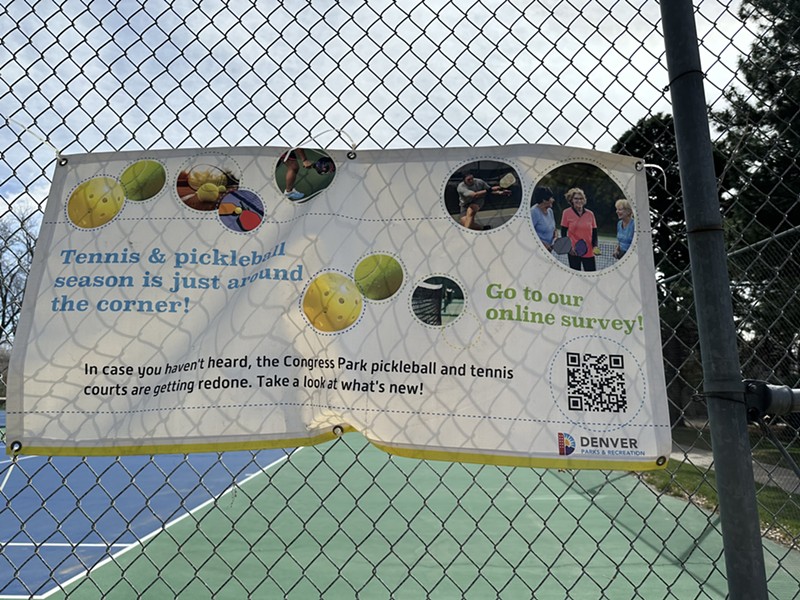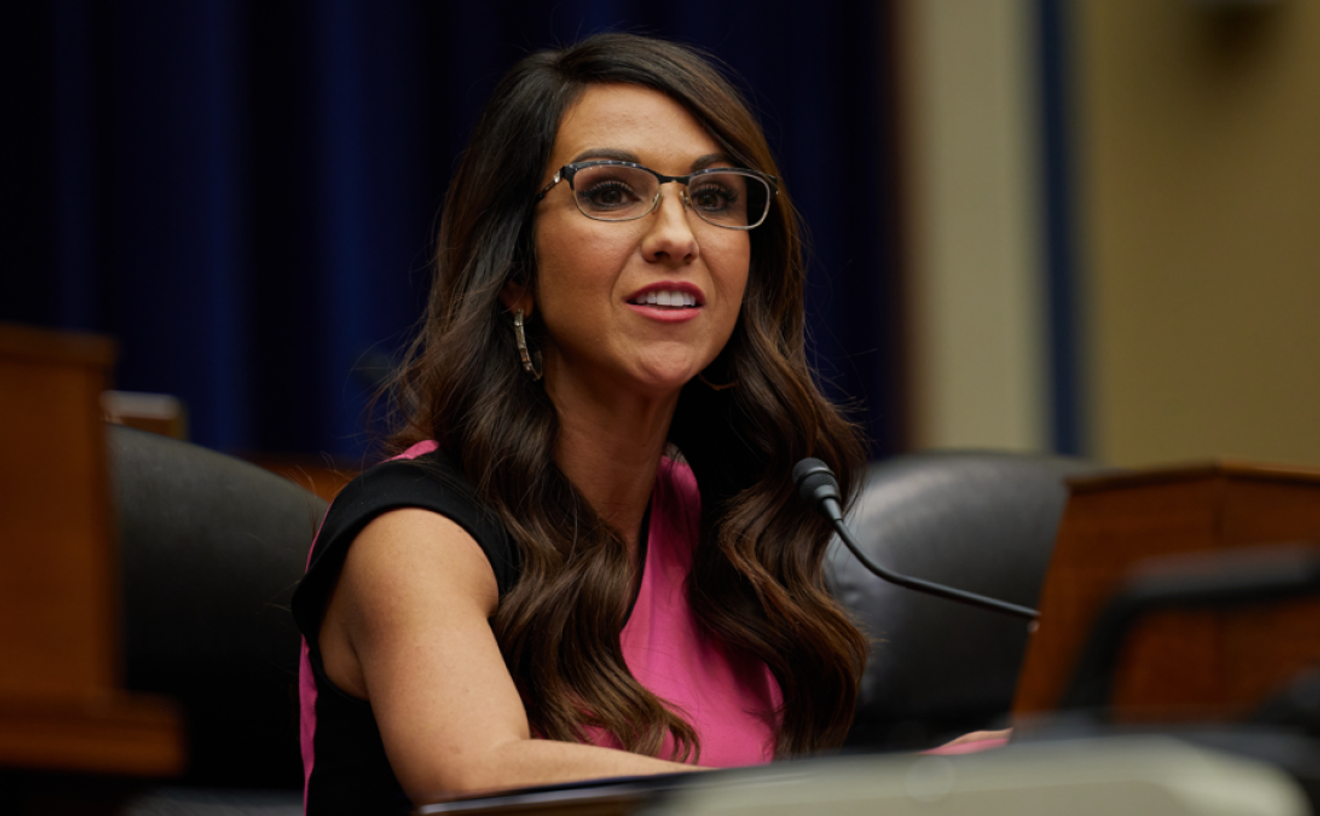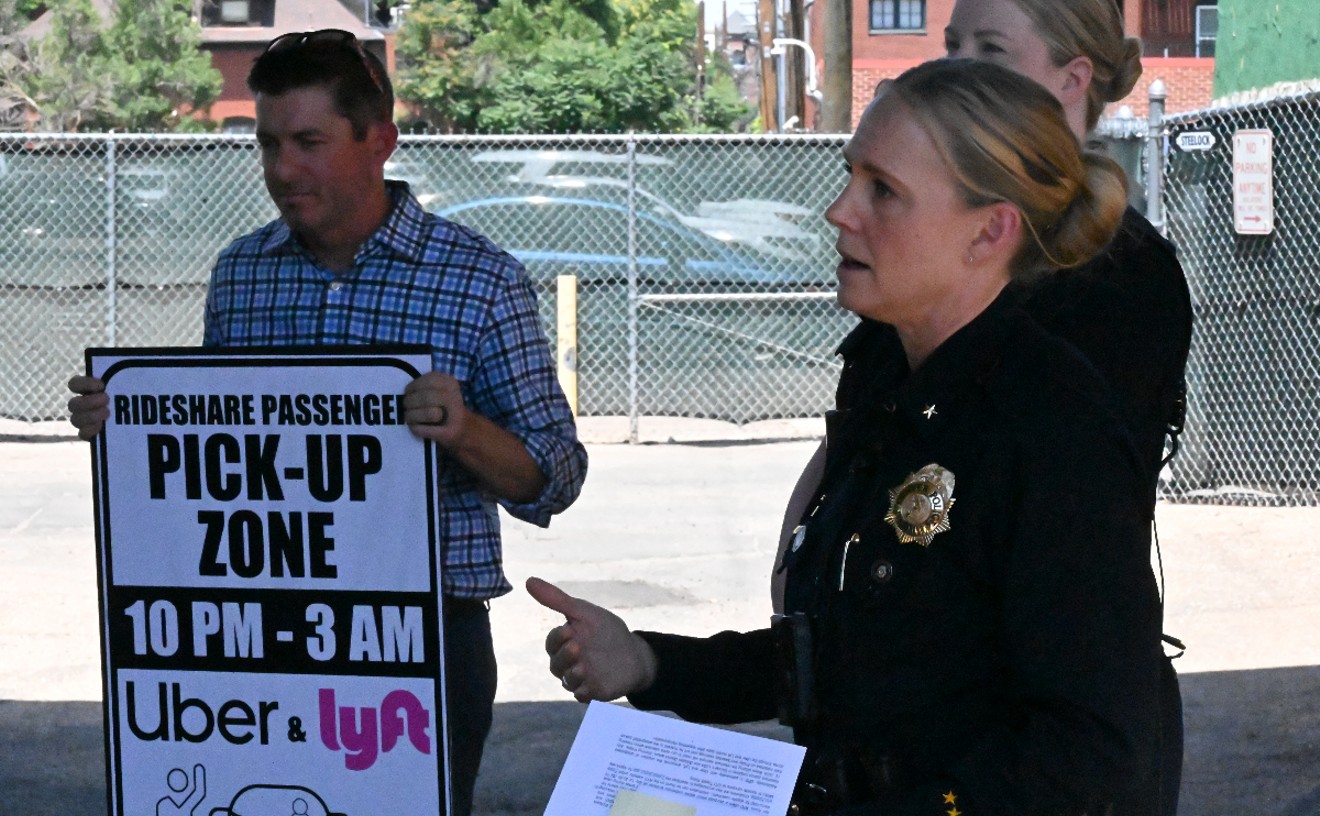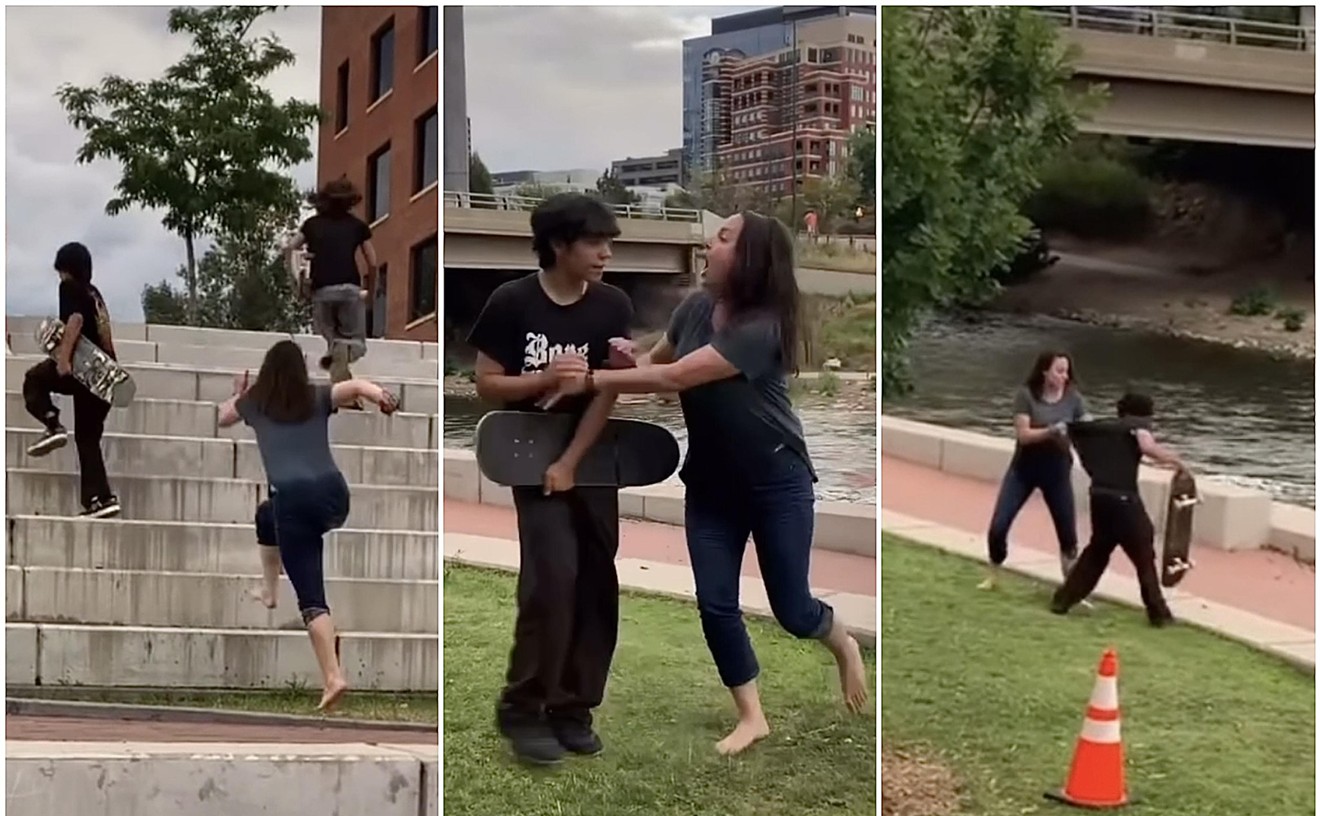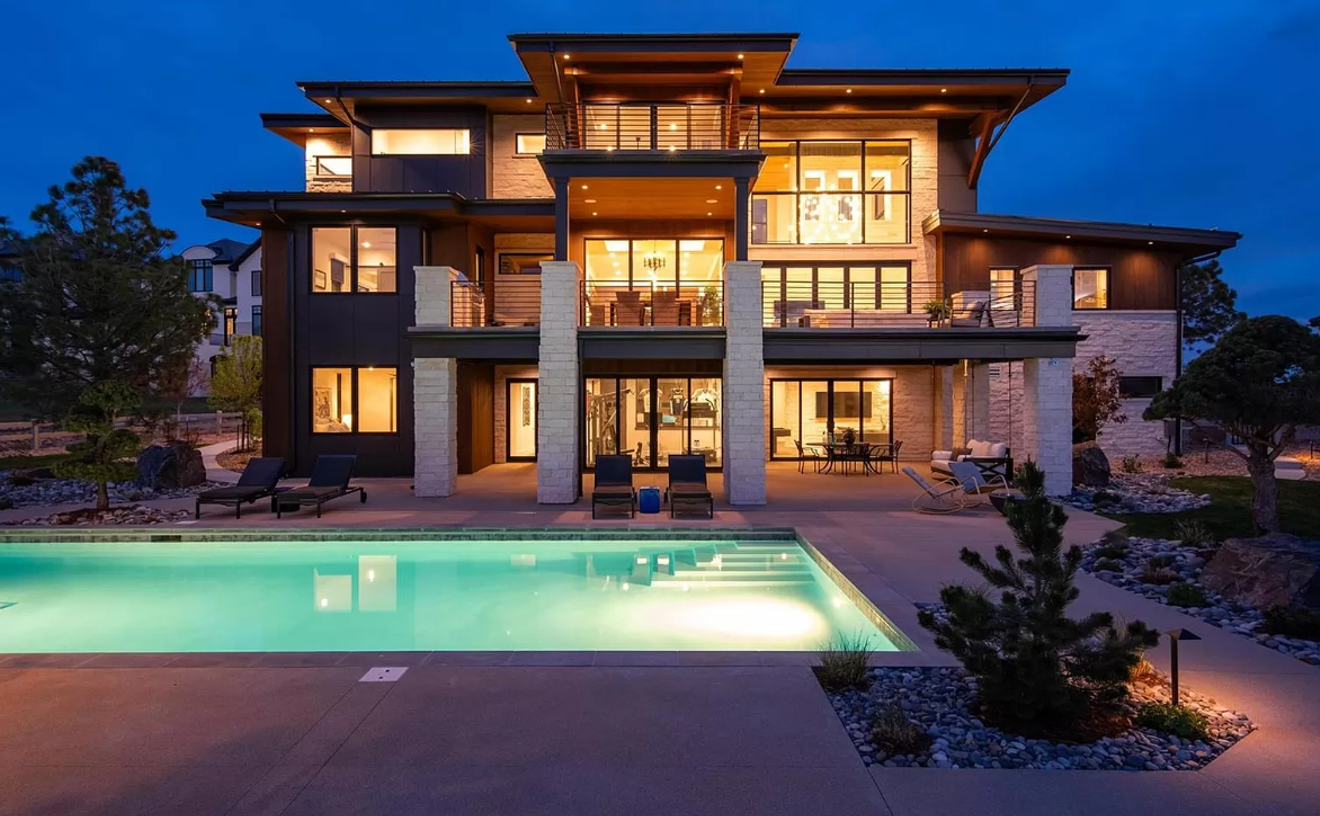Hollynd Hoskins, the attorney who represented 71-year-old "Mayor of Pickleball" Arslan Guney after he was criminally charged for drawing pickleball guide boxes on courts at the Central Park Rec Center, has filed an administrative appeal to the Denver Parks & Recreation Advisory Board over its “arbitrary and capricious actions, directives, orders and public notices" regarding the sport.
Although Hoskins isn’t one of the regulars at Congress Park, she's played pickleball before. So when Parks & Recreation recently shut down the courts at Congress Park for good, scrapping plans to move the courts away from neighbors who’d been complaining about noise, she sprang into action.
Hoskins requested public records from both Parks & Recreation and the Denver Department of Public Health & Environment, filing the appeal on behalf of over 170 specific citizens of Denver and the more than 6,000 members of the Denver Metro Pickleball Association, Denver Pickleball United, the Lavender Pickleball Club and the Central Park Pickleball Club.
One of those citizens is Deborah Saint-Phard, a sports medicine physician and former Olympic shot putter who lives about a mile from Congress Park. She says that pickleball has kept her and her teenage daughter close.
“When she comes down and says, ‘Hey, Mom, let's go play pickleball,’ there's no sweeter sound,” Saint-Phard says. “We don't have to have a reservation. We don't have to book something. …You can just show up and put your paddle in the rack, and you're next in line.”
It's important for pickleball to be maintained publicly, she adds, so that memberships and reservations are not required.
She and her daughter used to be able to walk to Congress Park to play. Now they have to drive to Martin Luther King Junior Park — contributing to air pollution along the way, Saint-Phard notes.
“Bringing community together in an accessible way should be the priority of Denver Parks & Recreation,” she says. “There was a plan that was in place that would have made everybody happy, and it got nixed because neighbors were complaining about what's happening currently, which nobody is advocating for.”
When Saint-Phard heard about the appeal, she wanted to be part of it because she saw a lack of leadership that allowed a plan that would have worked — moving the courts to the interior of the park — to be canned over pressure from a few citizens.
“The Pickleball Community is asking this Board for a Seat at the Negotiation Table,” reads the appeal, which claims that the public was not properly notified of the change in plans. "If we are not offered a seat at the table, we plan to peacefully bring folding chairs to your meetings so we are no longer on Denver Parks and Recreation’s Menu.”
The appeal tackles two issues: Parks & Recreation's treatment of pickleball — from prohibition in certain parks to the termination of pre-approved projects — and the conflict of interest between the department's deputy executive director, Scott Gilmore; his wife, Councilwoman Stacie Gilmore; and his brother’s Gilmore Construction company, which has contracted with the city on many projects.
The appeal further contends that the Department of Public Health & Environment did not make recommendations or issue orders related to suspending the Congress Park relocation before Parks & Rec made the decision to cancel it.
“DDPHE specifically advised DPR that ‘[a] sound study for each site is needed to come up with an accurate number, and the characteristics of each site (trees, topography, surrounding buildings, etc.) that would impact the distance between court and residential property to prevent violations,’” the complaint says.
Still, Parks & Recreation allegedly disregarded that direction and issued its own decision without backing from the city's noise ordinance.
“DPR and Deputy Gilmore failed to provide the required written notice to the 19-member [Parks & Recreation Advisory Board] of its proposed adopted rules excluding, prohibiting and restricting the sport of pickleball in violation of municipal codes, rules and regulations,” the appeal reads.
The decision about Congress Park came after an October 2022 noise level measurement by DDPHE that found that pickleball noise at Congress Park violated the noise ordinance. A second formal complaint from a neighbor was filed in February 2023, but the DDPHE did not re-investigate.
Instead, it “requested an update from DPR on the Project to move the existing courts away from the residences and relayed that it would be helpful for DDPHE to know if these old courts would be open or closed during the Congress Park Court Improvement Project.”
The department did not want to investigate a problem that would soon cease to exist, the complaint alleges.
On March 10, the DDPHE did another study of the current courts at the request of Parks & Recreation. But when Parks & Recreation announced that the Congress Park courts would be closed and the relocation project would be terminated on March 30, the proposed new location had not been examined in a specific noise study.
Also on March 30, Gilmore sent an internal email stating, “We will need to craft a response to these emails coming in. I will be getting some recommendations from DDPHE that supports our decision.”
The DDPHE’s response to Gilmore’s request for recommendations was that each site needs a study and no specific number of feet could be a general standard for where courts are or aren't allowed.
On April 13, the DDPHE finally finished its projection on the proposed new court locations. Those projections, the appeal notes, supported the idea that with sound mitigation, the new courts would not violate the noise ordinance.
Still, Parks & Recreation will not put courts in, because it claims that pickleball interferes with other park activities.
The appeal asks the advisory board to schedule special public meetings related to the popular sport and the potential Gilmore conflicts of interest. The pickleball players may not own homes right by Congress Park, but they do all pay taxes to fund the Parks & Recreation budget, the appeal points out.
“I'm a taxpayer," says Saint-Phard. "All of us are paying taxes in the city of Denver. We all want access to our parks. Finding a solution where we can all work together and play together, it seems like what we should be doing.”
After the appeal was filed earlier in the day, the community rallied at MLK Park on May 8; it's requested that the appeal be added to the Parks & Recreation Advisory Board's agenda for its May 10 meeting.
[
{
"name": "Air - MediumRectangle - Inline Content - Mobile Display Size",
"component": "12017618",
"insertPoint": "2",
"requiredCountToDisplay": "2",
"watchElement": ".fdn-content-body",
"astAdList": [
{
"adType": "rectangle",
"displayTargets": "mobile"
}
]
},{
"name": "Editor Picks",
"component": "17242653",
"insertPoint": "4",
"requiredCountToDisplay": "1",
"watchElement": ".fdn-content-body",
"astAdList": [
{
"adType": "rectangle",
"displayTargets": "desktop|tablet"
},{
"adType": "rectangle",
"displayTargets": "desktop|tablet|mobile"
}
]
},{
"name": "Inline Links",
"component": "18838239",
"insertPoint": "8th",
"startingPoint": 8,
"requiredCountToDisplay": "7",
"maxInsertions": 25
},{
"name": "Air - MediumRectangle - Combo - Inline Content",
"component": "17261320",
"insertPoint": "8th",
"startingPoint": 8,
"requiredCountToDisplay": "7",
"maxInsertions": 25,
"watchElement": ".fdn-content-body",
"astAdList": [
{
"adType": "rectangle",
"displayTargets": "desktop|tablet"
},{
"adType": "rectangle",
"displayTargets": "desktop|tablet|mobile"
}
]
},{
"name": "Inline Links",
"component": "18838239",
"insertPoint": "8th",
"startingPoint": 12,
"requiredCountToDisplay": "11",
"maxInsertions": 25
},{
"name": "Air - Leaderboard Tower - Combo - Inline Content",
"component": "17261321",
"insertPoint": "8th",
"startingPoint": 12,
"requiredCountToDisplay": "11",
"maxInsertions": 25,
"watchElement": ".fdn-content-body",
"astAdList": [
{
"adType": "leaderboardInlineContent",
"displayTargets": "desktop|tablet"
},{
"adType": "tower",
"displayTargets": "mobile"
}
]
}
]

